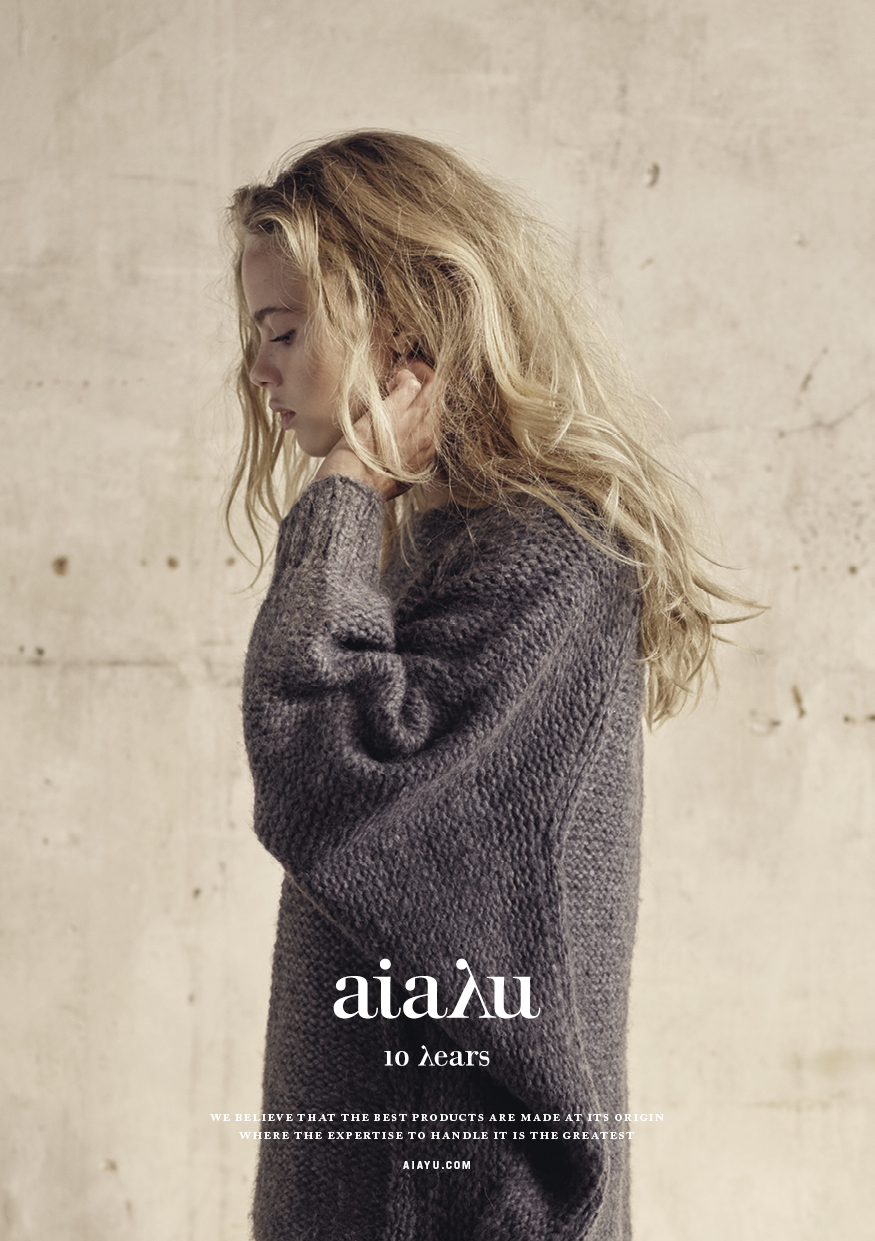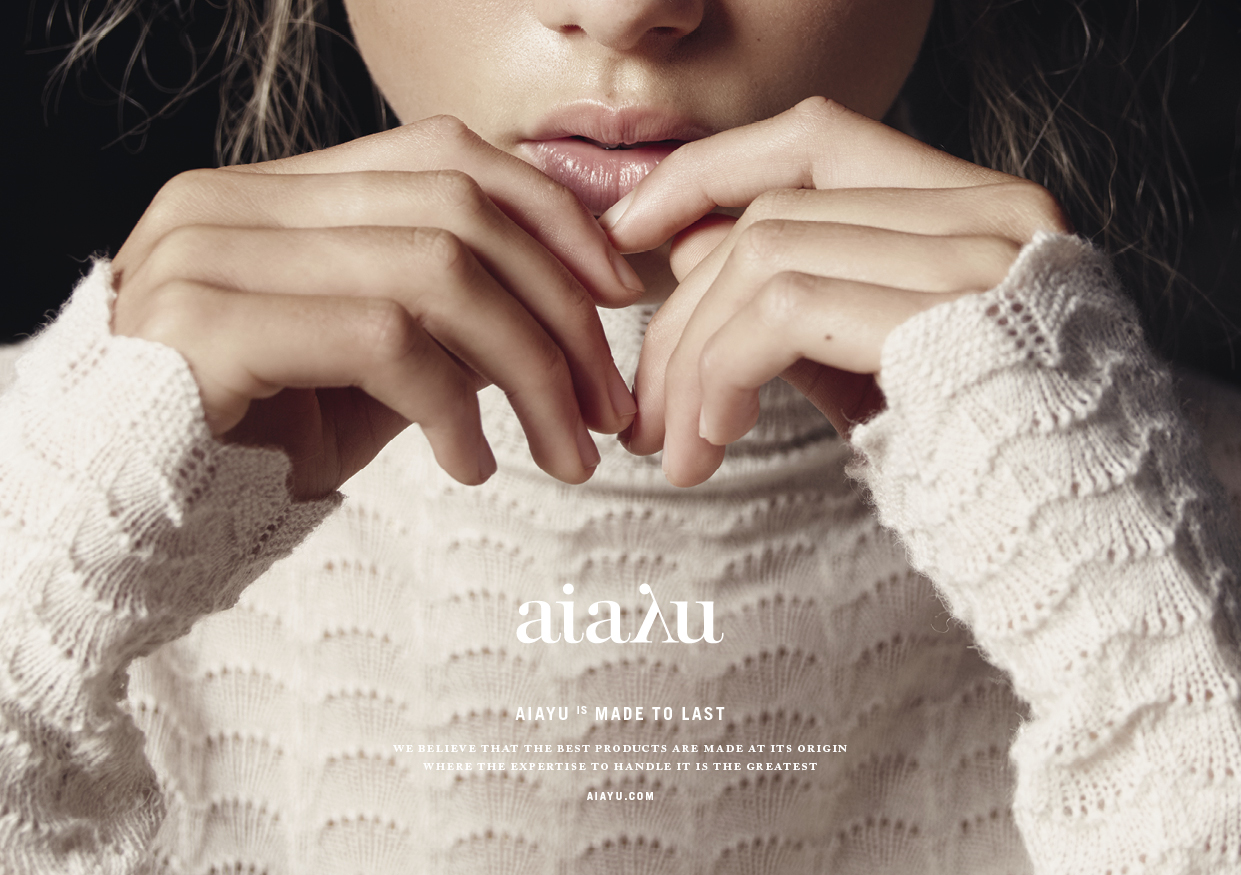Incorporating a human story into fashion making is one of the core values for Aiayu. Working with authentic, raw materials found in Nepal, Bolivia and India, the foreign-sounding Danish label brings you immaculately crafted fashion basics by skilled local artisans. The transparency factor behind the certified Scandinavian label? In addition to educative story telling about the origins of materials, Aiayu religiously equates the aesthetics with a larger environmental benevolence. With the help of a skilled pair of hands or two, Aiayu proves that a 100% responsible social mission is the only way forward in today’s sustainable design industry.
What are Aiayu’s principles and philosophy?
In a world filled with meaningless products made via mass production, it’s becoming more and more important to choose products with a soul, from companies with a conscience. At Aiayu, our concept is all about natural, organic materials handmade by artisans using ancient techniques to create timeless designs born to be worn, lived with and loved. [We are interested in] involving working conditions that comply with international standards, as part of a certified sustainable production process designed to minimise any harm done to the planet, or the people who inhabit it.
What's the biggest accomplishment for Aiayu so far?
Some accomplishments have been [reached] internally, so to speak. Having the factory in Bolivia WRAP (Worldwide Responsible Accredited Production) certified took many years and is a big step forward in a Third World country. Another accomplishment is to be seen in the company of Gwyneth Paltrow in her new cookbook. [For us it means a lot that] people take a liking in our brand, because it is beautiful and comparable to other brands that are not necessarily sustainable. [The fact that] our products are attractive enough in itself is a big accomplishment.
What Third World regions are you working with and how does it go together with your social mission?
Our social mission is to produce, where the material originally comes from and where they have the specific skills to work with it. We want to preserve the heritage of the people who we work with, and make them proud of something they take for granted. Today we work with Bolivia in knits, India for cotton and Nepal for cashmere and yak. The origin determines the quality. We are deeply rooted in our love for natural materials - these exquisite raw materials are the main source of inspiration when creating our product range, and they continue to inspire us to evolve our concept. Our idea is to simply refine what nature has already designed so beautifully.
“I hope we stand out in telling the story not only as a marketing tool, but giving people a feeling of being close to the process and the people behind it. […] It’s the human story we need to transcend to the end customers.”
By what it feels like, more and more Scandinavian brands are pushing forward ethical principles in their businesses. What’s unique about Aiayu’s approach?
I hope we stand out in telling the story not only as a marketing tool, but giving people a feeling of being close to the process and the people behind it. We get initials engraved inside the garments to trace the women, who knitted them. These are they stories people want to hear and relate to, much more than just a certification. It’s the human story we need to transcend to the end customers.
How can we make something that affects us all on global scale reach its meaning to the end consumer? Could it be a question of personalising, creating a story that delivers around it?
As mentioned above, I think it is very much about telling a personal story of the people behind [production]. Teaching people something. People want to learn and get skilled. Working in depth with our factories and materials, we have knowledge that we have to keep on reminding ourselves to share and not take for granted. Sharing our brand’s personal story means educating people in a good way…
In your opinion, what are the key concerns the fashion industry still faces? If you could make one change that has no reverse effect, what would it be?
The massive consumption and fast consumption of clothes. Overproduction and overload of needs, fast-moving trends. Purchasing long-lasting pieces makes you value your clothes even more. At Aiayu, the quality of the clothes also has the effect that people buy fewer pieces from us, but they come back. They naturally buy fewer pieces because the last for a long time, but the longevity and durability of the product makes people feel they get the value for money. Our customers understand the value of good quality.
“We are deeply rooted in our love for natural materials - these exquisite raw materials are the main source of inspiration when creating our product range, and they continue to inspire us to evolve our concept.”
In addition to selling fashion products, how important is it to educate people on how to take care of their fashion purchases?
It is super important! [This is] to make them appreciate their products, old and new. Our marketing approach also incorporates a mission to make people proud of what they have already purchased, not only to think about what they are going to purchase next. It is conflicting with our short-term business goals, but we believe that it is a long-term achievement that will come back to us well.
“Our marketing approach also incorporates a mission to make people proud of what they have already purchased, not only to think about what they are going to purchase next.”
In your opinion, has the digitalisation of our culture made it harder or simpler to spread your message? Is there anything you would change about this surrounding 'fast and more' culture?
If the media is used right, I think it gives us a unique opportunity to connect directly to the consumer, and to break it up into fewer pieces, so that people can consume [the information]. Instagram and Facebook feeds deliver information in smaller bits to make people read more without losing interest, whereas a website often makes them just to look at the pictures. About the social media influence as a whole, I think you can use it to your advantage – even though these fragments are fast-moving. But before starting, make sure you have your vision and goals clear far afield.









